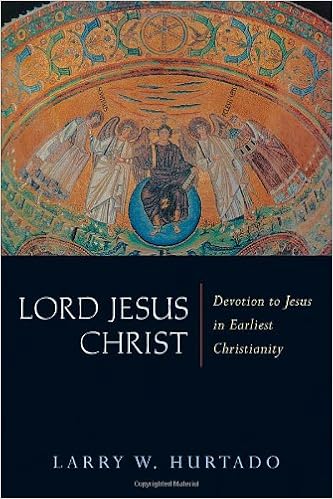My friend Barney Aspray has kindly hosted a post we have worked on together on the question of Praising "The LORD" in English. Unfortunately the site is experiencing an issue at the moment, but I will post up the link as soon as possible. Today I will post just the opening part and also provide my entire French adaptation, which I am also trying to share with
Mon ami Barney Aspray a gentillement publié un article que nous avons travaillé ensemble sur la question de Louer "Le SEIGNEUR" en anglais. Malheureusement, le site a un problème technique en ce moment, mais je donnerai le lien dès que possible. Aujroud'hui je partage la première partie mais aussi mon adaptation intégrale en français. Cette dernière fait l'objet d'une demande de partage que j'effectue auprès de l'Alliance Biblique, mais ce sera mis en stand-by pour un petit temps.
Despite these apparently legit concerns, ‘the Lord’ is somehow managing to dodge reassessment in nearly all of our most modern and dynamic translations into English. And so ‘the Lord’ limps on. Why is that? The reasons are multiple. Shaking the earth clear from each root we progressively loosen history’s firm hold on this inadequate expression. Could praising the Lord be one of these roots? (.... read the full article soon on the EveryDayTheology blog
Dans la langue française telle qu’elle soit parlée et écrite aujourd’hui, l’emploi de « Seigneur » s’est vraiment effondré, et le peu qui demeure n’est pas très gai ! Surtout maintenu dans les histoires fantastiques, comme Le Seigneur des Ténèbres, Voldemort, de Harry Potter, Les Seigneurs Noirs des Sith, de Star wars, et Le Seigneur des Anneaux, on pourrait se poser la question si de manière générale le titre de « Seigneur » s’est approprié des connotations bien moins positives.
Mon ami Barney Aspray a gentillement publié un article que nous avons travaillé ensemble sur la question de Louer "Le SEIGNEUR" en anglais. Malheureusement, le site a un problème technique en ce moment, mais je donnerai le lien dès que possible. Aujroud'hui je partage la première partie mais aussi mon adaptation intégrale en français. Cette dernière fait l'objet d'une demande de partage que j'effectue auprès de l'Alliance Biblique, mais ce sera mis en stand-by pour un petit temps.
One of the most famous and sung anthems from the Psalms is the beautiful sentiment of αλληλουια, Hallelujah, rendered ‘Praise the Lord’ in many of our modern English Bibles and hymn sheets.
Unfortunately, since ‘the LORD’ was suggested by John Wycliffe—way, way back in the late 1300s—it has become a poor translation of the Hebrew Name for God, Yahweh.
In the English spoken and written today, ‘Lord’ usage has really slumped, and the little that remains is scarily dark! Whether it is a warlord or drug lord, or a science-fiction / fantasy genre bad guy (e.g. Lord Voldemort in Harry Potter, the Dark Lords of the Sith in Star Wars and even the Lord of the Rings), the connotations are not good. Even landlords can be pretty dark and shady characters you might be thinking!
In addition to the usage problems, there are some rather striking grammatical issues with ‘the Lord’, in part arising from the fact that Wycliffe and other medieval translators were translating directly from the Latin Vulgate.[1] Finally, we continue to see young people leaving the church in their droves, seemingly still in search of good, stable and accessible forms of authority, purpose and spirituality in their lives.
Unfortunately, since ‘the LORD’ was suggested by John Wycliffe—way, way back in the late 1300s—it has become a poor translation of the Hebrew Name for God, Yahweh.
In the English spoken and written today, ‘Lord’ usage has really slumped, and the little that remains is scarily dark! Whether it is a warlord or drug lord, or a science-fiction / fantasy genre bad guy (e.g. Lord Voldemort in Harry Potter, the Dark Lords of the Sith in Star Wars and even the Lord of the Rings), the connotations are not good. Even landlords can be pretty dark and shady characters you might be thinking!
In addition to the usage problems, there are some rather striking grammatical issues with ‘the Lord’, in part arising from the fact that Wycliffe and other medieval translators were translating directly from the Latin Vulgate.[1] Finally, we continue to see young people leaving the church in their droves, seemingly still in search of good, stable and accessible forms of authority, purpose and spirituality in their lives.
Despite these apparently legit concerns, ‘the Lord’ is somehow managing to dodge reassessment in nearly all of our most modern and dynamic translations into English. And so ‘the Lord’ limps on. Why is that? The reasons are multiple. Shaking the earth clear from each root we progressively loosen history’s firm hold on this inadequate expression. Could praising the Lord be one of these roots? (.... read the full article soon on the EveryDayTheology blog
ARTICLE COMPLET EN FRANCAIS!
Une des belles expressions de culte la plus connue des écritures Bibliques et chantée le dimanche matin se retrouve dans les Psaumes, vous la connaissez sûrement bien : « Louez l’Éternel », ou «Louez le SEIGNEUR», rendue en Grec αλληλουια (c’est d’où vient « Alléluia »).
Malheureusement, depuis que « le Seigneur » a été donné comme traduction en français par Guyart des Moulins—il y a long, longtemps en 1297—elle est devenue une traduction insuffisante pour porter le nom Hébreu de Dieu, Yahvé (ou Yahweh).
Extrait de traduction réalisée par Guyart des Moulins en 1297, première traduction biblique en français (Proverbes 9:10)
Dans la langue française telle qu’elle soit parlée et écrite aujourd’hui, l’emploi de « Seigneur » s’est vraiment effondré, et le peu qui demeure n’est pas très gai ! Surtout maintenu dans les histoires fantastiques, comme Le Seigneur des Ténèbres, Voldemort, de Harry Potter, Les Seigneurs Noirs des Sith, de Star wars, et Le Seigneur des Anneaux, on pourrait se poser la question si de manière générale le titre de « Seigneur » s’est approprié des connotations bien moins positives.
Dark Vader, Seigneur Noir des Sith
de Star Wars
S’ajoutant aux problèmes d’emploi sont des questions grammaticales marquantes. Celles-ci peuvent s’expliquer par le fait que Guyard des Moulins, John Wycliffe et les autres traducteurs médiévaux se servaient en partie ou même en totalité de la Vulgate (version en latin de la Bible de l’église Catholique) comme langue de source pour réaliser leurs traductions respectives.[1] Enfin, nous continuons à constater que les jeunes quittent l’église en masse, pourtant toujours en quête de formes positives, stables et accèssibles d’autorité, de sens et de vie spirituelle.
Malgré ces inquiétudes légitimes, « le Seigneur » a réussit à s’échapper presque toute remise en question dans la plupart de nos traductions françaises dîtes modernes ou dynamiques d’aujourd’hui. Pourquoi?
Les raisons sont multiples. En libérant chaque racine de la terre qui l’obscure, nous nous permettons un lâcher-prise sur cette traduction insuffisante. Est-ce que « louer le Seigneur » pourrait être l’une de ces racines ?
Je contemplais cette notion, donc, de αλληλουια (Alléluia, Louez le SEIGNEUR, Louez l’Eternel). Je me suis arrêté, paisiblement. Malgré les problèmes que j’essayais de rendre visibles, il y avait et il y a quelque chose de si bon ici. Pourquoi l’appellerais-je même « beau » ? Puisque valoriser tout ce qui est bon est beau. Cela me fait sourire en profondeur lorsque le fond de la phrase transcende mes inquiétudes sur sa forme et je suis donc bien reconnaissant de cette perspective supérieure !
Cependant, je me retrouve face à une idée intéressante. Est-ce qu’il serait possible que notre adoration francophone « du Seigneur » aurait depuis des siècles fortifié ce langage ? Relisez avec moi très doucement les paroles en question (la ponctuation est là pour nous ralentir un peu).
L O U E Z :
« L E. S E I G N E U R. » [2]
Qu’est-ce que cette instruction opère à notre inconscient chrétien collectif ? Gardons en tête que ce soit une pratique spirituelle très ancienne, belle, bonne et sacrée. Néanmoins, dans la façon que c’est formulé, elle pourrait conduire à figer ces vieux mots français à ce niveau profond et intime à cause d’une confusion en traduction : Louez celui dont le nom est ‘Le SEIGNEUR’, plutôt que louez celui dont le nom a été traduit par ‘Le SEIGNEUR’, et investissez ce titre français de valeur, de sainteté et d’amour. Faites de ce titre français médiéval le véritable nom de Dieu, et préservez-le donc à tout prix.
Malgré les apparences, il s’agit d’une transition signifiante de perspective. Le nom d’une personne est relativement intemporel et il est conçu pour désigner la personne même, de telle sorte que le nommé et le nom ne font qu’Un.
Nous pouvons constater ce phénomène déjà à l’œuvre dans l’ancien testament :
« Tous les peuples de la terre verront que tu es appelé du nom de « l'Eternel » et ils auront peur de toi » (Deutéronome 28.10, Segond 21)
Donc, si nous apercevons qu’on nous exhorte à « louer le Seigneur », réfléchissons à la fois à la puissance de l’idée de ce psaume et à l’incapacité de « l’Eternel » ou de « le Seigneur » à continuer à nommer celui que nous appelons également « Dieu ».
Quant aux traducteurs, eux aussi sont des chrétiens. Ils ressentent aussi un fardeau de fidélité forte au passé, et ils aperçoivent aussi le statut privilégié inculqué par toute la louange et honneur associés à ce nom prétendu « du Seigneur ». Une remise en question sérieuse du vocabulaire autour de l’autorité divine est donc évitée, mais ce n’est pas obligé que c’en soit ainsi ! Une fois que nous réalisons tous que :
- ‘le Seigneur’ n’est pas sacré de son propre sort,
- ‘le Seigneur’ n’était peut-être pas la meilleure traduction en français même au moyen âge, et que
- ‘le Seigneur’ est tout à fait incapable de représenter les divers niveaux d’autorités signifiés dans les langues d’origine,
. . . alors nous les chrétiens de 2019 pouvons repenser comment exprimer l’autorité divine dans nos vies.
Et nous le faisons déjà. Par exemple, Eugene Peterson a eu un succès éblouissant avec sa traduction, The Message en anglais qui a beaucoup remis en question l’expression sœur en anglais, « The LORD ». Au lieu de répéter de manière irréfléchie les 6894 instances de « l’Eternel » par « The LORD », il a opté pour « DIEU » (ou simplement, Hallelujah ! )[3] Dans d’autres lieux d’interface entre l’église et la société, il semble bien qu’il y ait une dépendance réduite en discours de « seigneurie ». Attention, je ne dis pas qu’il n’y a pas encore beaucoup d’attachement au mot ni que l’attachement n’a pas de très bonnes explications, mais que la manière que l’autorité de Dieu ou de Christ s’exprime, lorsqu’il s’exprime bien, évolue et doit évoluer. Mais il reste beaucoup à faire ! Nous avons besoin de perspectives et ressources linguistiques nouvelles qui nous invitent à expérimenter et exprimer l’autorité divine comme quelque chose de vraiment digne de notre louange. Pour cela nous avons besoins d’outils en français courant parce que le Grecque c’était en Grecque courant, tout simplement !
En conclusion, « le Seigneur » a eu son moment utile, le grand attachement que ressent l’église au mot peut s’expliquer aussi, mais il faudrait rattraper le retard par réexaminer comment nous devrions expressimer cette—si importante à une vie chrétienne contextualisée. Je suis certain que Guyart des Moulins en serait ravi 😊.
[1]
This problem concerns the adding of articles that the Hebrew authors and Greek
translators were so careful to avoid in order to preserve the personal name of
God. Since Latin does not have articles, translators may have been ignorant of
this fact.
Ce problème concerne l’ajout des articles que les auteurs hébreux et traducteurs grecques avaient avec prudence évité dans les langues d’origine afin de préserve le caractère d’un vrai nom personnel de Dieu. « L’Eternel », malgré son assez grande originalité ne s’échappe pas non plus, donc, de ce piège posé par la traduction directe du Latin.
[2] Cet effet est également percutant ailleurs, tel que : Entrez, courbons-nous, inclinons-nous, mettons-nous à genoux devant « le SEIGNEUR » qui nous a faits (Psaume 95.6, PDV, guillemets ajoutés)
[3] Ce n’est pas une réflexion que ni la Bible en Français Courant ni la Parole de Vie ne semblent prêtes encore à entreprendre.
Ce problème concerne l’ajout des articles que les auteurs hébreux et traducteurs grecques avaient avec prudence évité dans les langues d’origine afin de préserve le caractère d’un vrai nom personnel de Dieu. « L’Eternel », malgré son assez grande originalité ne s’échappe pas non plus, donc, de ce piège posé par la traduction directe du Latin.
[2] Cet effet est également percutant ailleurs, tel que : Entrez, courbons-nous, inclinons-nous, mettons-nous à genoux devant « le SEIGNEUR » qui nous a faits (Psaume 95.6, PDV, guillemets ajoutés)
[3] Ce n’est pas une réflexion que ni la Bible en Français Courant ni la Parole de Vie ne semblent prêtes encore à entreprendre.





